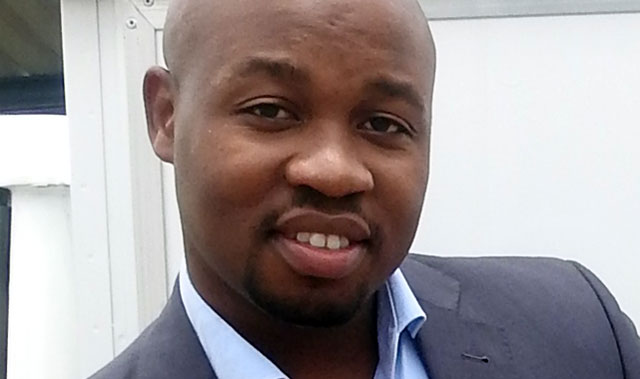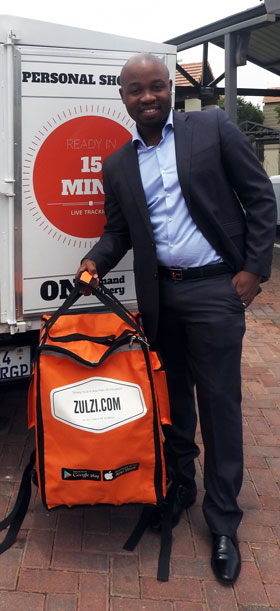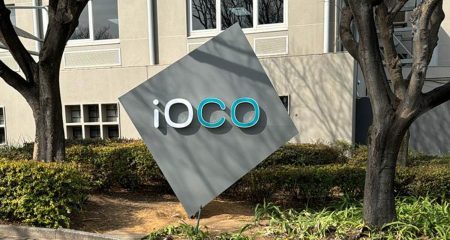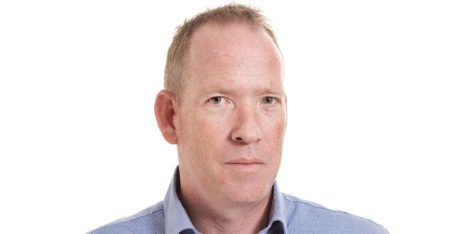
What if everything you ordered on the Internet was delivered to your door in less than 60 minutes?
That’s what a new start-up, Zulzi, is promising. Donald Valoyi, its founder and CEO, has big ambitions to build an Uber-like fulfilment platform that transforms the logistics business in South Africa.
Valoyi, 31, who studied towards a BSc in applied mathematics from Wits University, cuts an unlikely figure for someone who wants to upend an industry.
The soft-spoken Valoyi, who told TechCentral that he has always been “fascinated with computers”, grew up in the dusty streets of Ntshuxi in rural north-eastern Limpopo.
After completing his studies at Wits (and acquiring a Sun-certified Java developer qualification along the way), he went into “corporate” as a software developer, working for companies such as Telkom, Tibco SA and EOH, and later at First National Bank.
But the corporate life wasn’t for him. In 2014, after doing “plenty of research”, he quit FNB, striking out on his own with a business that sold various goods, including books and electronics, online.
It turned over R6,4m in its first year, and R10,8m in year two. The company’s success came in large part from a promise to deliver university textbooks to students within an hour.
Valoyi saw a gap in the market for “on-demand delivery” more broadly — delivering food, retail goods and products ordered online faster than anyone else in the market. He used the money his business had made selling textbooks to jumpstart Zulzi.
Zulzi is a contraction of the isiZulu word “zuzile”, which means “to achieve something”, according to Valoyi.

Encouraged by companies like Uber, Valoyi realised he could build a delivery network without having first to invest in a network of drivers and vehicles. He could even pay Uber drivers to deliver services using Zulzi. “If you can sell stuff and get it to people within an hour, then people become much more interested [in shopping online],” he said.
When a user enters their delivery address in the Zulzi app — which is available for Android and iOS — it shows them what’s available in their vicinity, from restaurants to supermarkets. Generally, prices are the same as in-store (where there are variances, these are communicated).
Once an order is placed — say, for a variety of grocery items from the local Pick n Pay — a Zulzi “personal shopper” is then alerted via their smartphone and they begin shopping.
Once paid for, a driver then collects it from the shopper and takes it to where it’s supposed to go. The buyer, meanwhile, is able to monitor progress of their order via the app through live-tracking.
Zulzi developed the platform, from the mobile applications for both customers and the drivers (“Zulzi hoppers”) to the analytics engine, entirely in-house. It has eight full-time developers (with 14 permanent staff in total and 58 independent contractors). The technical team is led by chief technology officer Michael Netshipise, who is a former head of architecture at FNB and Absa online.
The service is not unlike Uber’s UberEats food delivery platform, but is broader in that it’s not limited to food. Valoyi said drivers could easily work for both platforms.
The full delivery charge (R20 for food and between R35 and R85 for groceries) goes to the driver (or his company), with Zulzi deriving its revenue from partnerships with retailers and restaurants. A second source of revenue is in-app advertising aimed at end users.
The platform is still in early development (it was launched only six weeks ago), but Valoyi is already preparing for the second phase of the roll-out, which will include professional services — “gardeners on demand”, for example, he said. It has signed up about 2 200 subscribers, with many people using the app daily.
About 60% of transactions that have flowed across the platform so far have been for fast-food deliveries. About 30% has been groceries, with the remaining 10% pharmaceuticals and liquor.
The service is only available in the northern suburbs of Johannesburg for now (in an area that spans from Fourways and Midrand in the north, through suburubs such as Sandton, Sunninghill, Bryanston, Parktown, Rosebank and Randburg, to the CBD in the south). Plans are afoot to launch in limited areas in Cape Town and Durban, too, in the coming weeks.
Customers in the right coverage areas can already order from Pick n Pay, Woolworths, Dis-Chem, Liquor City and Pick n Pay Liquor, along with a range of restaurants and fast-food outlets. “We eventually want to do this for everyone, partnering with them, allowing consumers to order stuff and get it within an hour.”
Valoyi said he is in talks with the view to raising a first round of funding — until now, it’s been entirely self-funded. His long-term ambition is to build an entire mall into the app, integrating tightly with a large number of retailers and offering a wide range of goods and services to consumers.
He is also keen to partner with e-commerce companies. “If they want things delivered within an hour, then we are the guys to talk to. We are the on-demand guys.” — © 2016 NewsCentral Media




